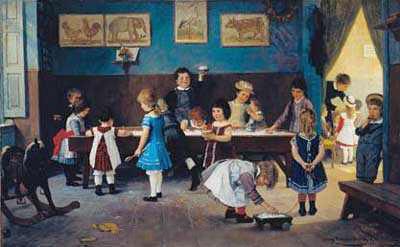 |
| Kindergarten, where we learn the basics of how to treat one another |
A famous saying hanging on the walls in many offices, especially those of caregivers, speaks of the lessons that teach us to care for one another and do the right thing in terms of concern for others as the type we learn in kindergarten, but these are sublimated or dismissed by those who live with socially and politically self-centered attitudes and behaviors. Here is how forgetting those lessons can also lead to mental health problems.
In order to forget those things that seem to be almost common sense and simple enough for a kindergartner can create confusion and anger over time. Having to offer one set of beliefs that counter the basic social beliefs one learns early in life creates the kind of stress that over time might lead to depression. Also forgetting those basics can, and has, lead to wars and to social and political problems throughout man's history
What is that
favorite saying that offers us those kindergartner basics?
“These are the things I learned (in Kindergarten):
1. Share everything.
2. Play fair.
3. Don't hit people.
4. Put thngs back where you found them.
5. CLEAN UP YOUR OWN MESS.
6. Don't take things that aren't yours.
7. Say you're SORRY when you HURT somebody.
8. Wash your hands before you eat.
9. Flush.
10. Warm cookies and cold milk are good for you.
11. Live a balanced life - learn some and drink some and draw some and paint some and sing and dance and play and work everyday some.
12. Take a nap every afternoon.
13. When you go out into the world, watch out for traffic, hold hands, and stick together.
14. Be aware of wonder. Remember the little seed in the Stryrofoam cup: The roots go down and the plant goes up and nobody really knows how or why, but we are all like that.
15. Goldfish and hamster and white mice and even the little seed in the Styrofoam cup - they all die. So do we.
16. And then remember the Dick-and-Jane books and the first workd you learned - the biggest word of all - LOOK.”
―
Robert Fulghum,
All I Really Need to Know I Learned in Kindergarten
Those who practice the trickle down notions or who believe in Ayn Rand's theory of each man or woman just taking care of himself or herself make compromises, especially when they know that the great amounts of money they hold don't trickle down to the needy. Winning at any cost is no way to play fair. Taking ideas and products from others is a too common activity, whether it is a piece of music or an idea for a business. People create problems for themselves and others, then excuse them with "Mistakes were made," which offers no admission of guilt for doing something wrong and dismisses the idea of being sorry. These behaviors done by people who wield power over others can create widespread social problems. They also create problems for the individual that can lead to poor mental and physical health.
Those personal health problems come from disregarding safety issues and not caring for the safety of others, by not taking time to meditate and enjoy the beauty of creation, or to remember that life is to be lived in the moment. Not remembering that we are all alike in very simple ways, that we all need the necessities of life to grow and that we all need one another can lead to the wide discrepancies between rich and poor and the disregard of victims of war and violence.
Psychologists tell us there are
many causes of depression. But one of these has to do with conflict. The conflict can be with others, causing anger, frustration, anxiety that result in depression. Or it can be internal conflicts that come from having one set of standards in conflict with other standards. To relieve the anxiety that comes from behaviors outside of what are those basics, both children and adults will act out. They will display anger or turn that anger inside into depression. The stress from internal conflicts is a major cause of depression.
Those lessons learned in kindergarten offer the basics that work for children and for adults. Robert Fulghum, the author of the poem that offers these lessons summarizes the lessons for life as this:
“Think what a better world it would be if we all-the whole world-had cookies and milk about three o'clock every afternoon and then lay down with our blankies for a nap. Or if all governments had as a basic policy to always put things back where they found them and to clean up their own mess.
And it is still true, no matter how old you are-when you go out into the world, it is best to hold hands and stick together.”

Great article! really enjoyed it! and yes....If only!
ReplyDelete